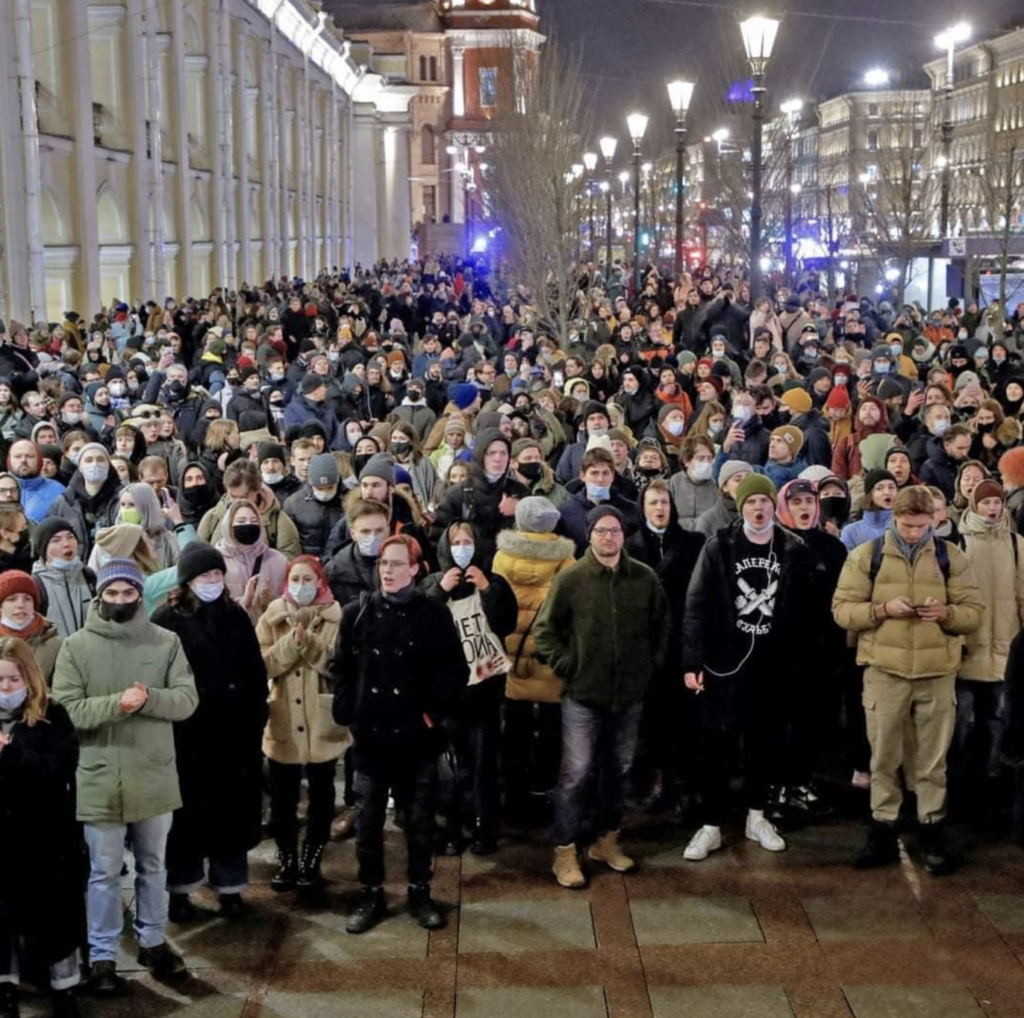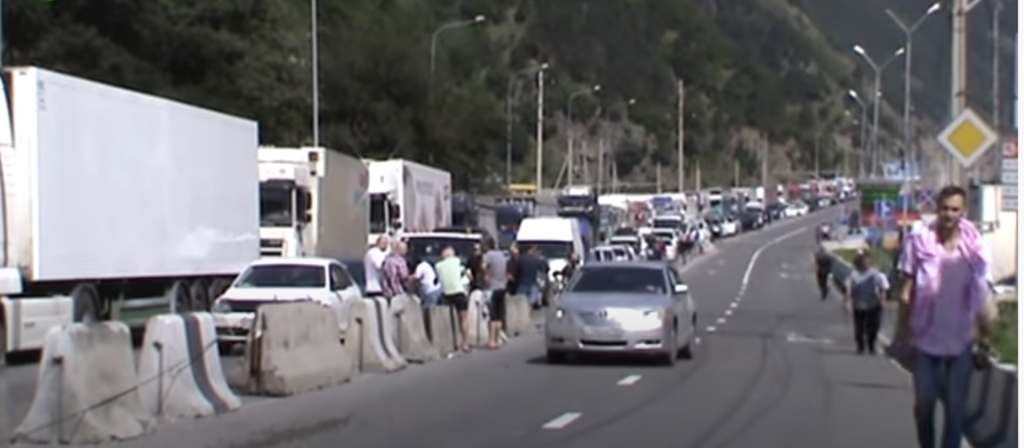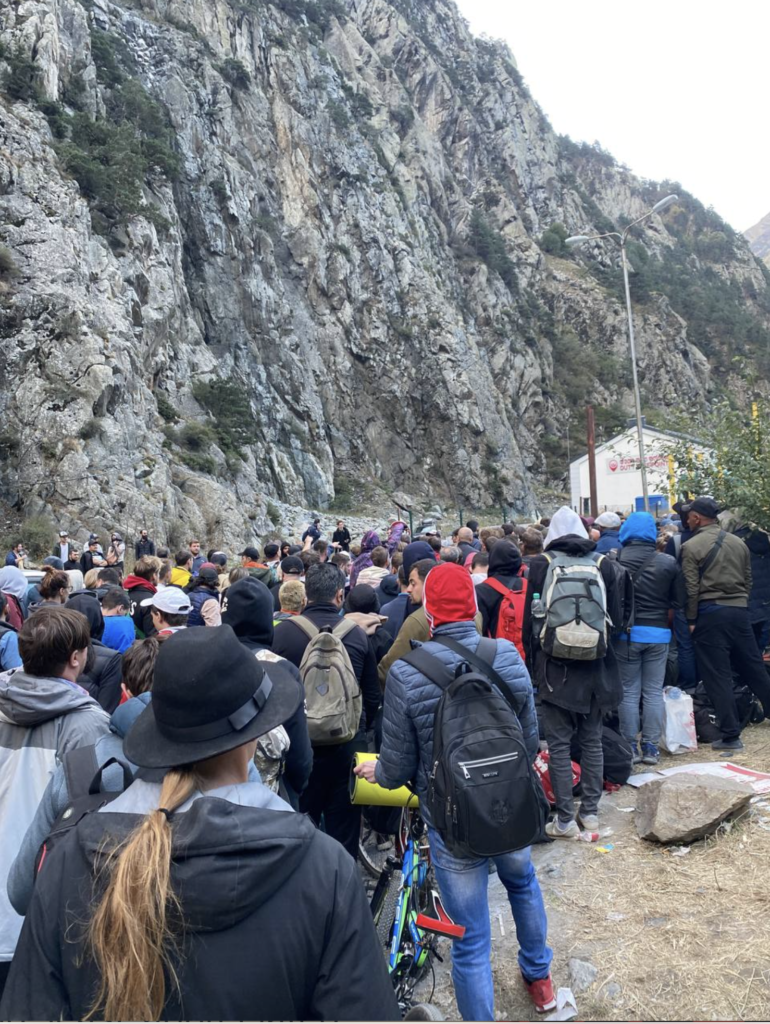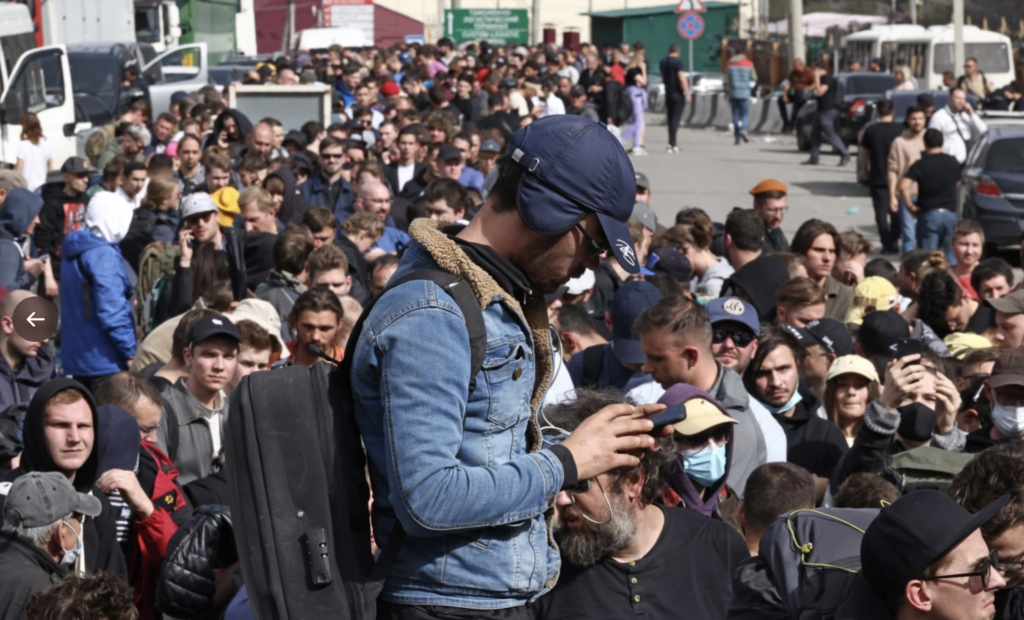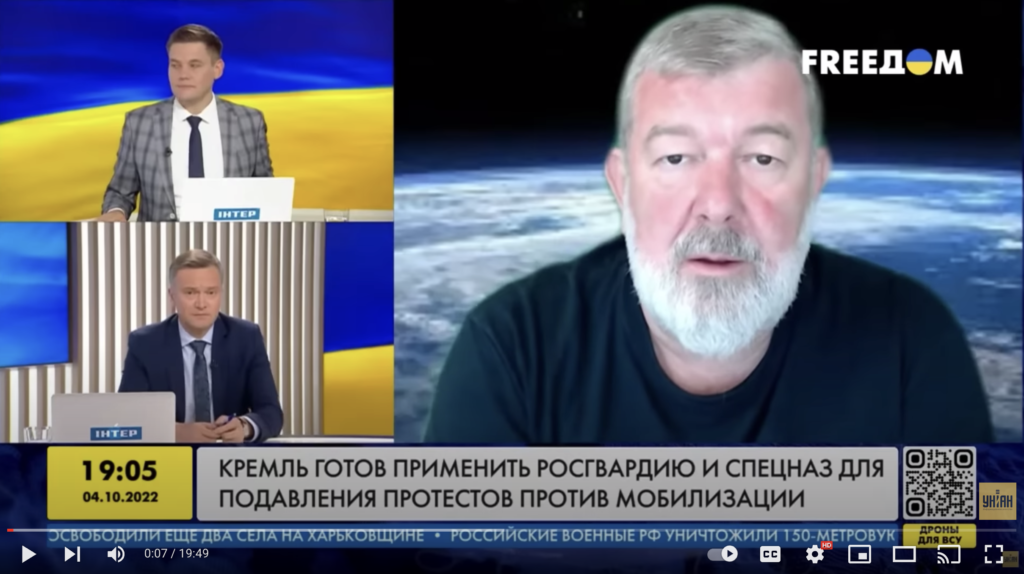It is extremely difficult to learn what are Russians’ opinions today on political questions, as almost no Russian tells sociologists what they really think. Besides, the situation depends on the development of the war in Ukraine and it changes literally every hour. Still, combining questionable data presented by polls with rich material of the Internet publications and discussions and also with the facts of social behavior of Russians, it is possible to get more or less a realistic picture of what most Russians really think.
Here are excerpts from the last poll made in the end of September by the only Russian independent sociological institution, the “Levada Center”:
“At the end of September, compared to August, the proportion of those who believe that things in the country are going in the right direction has decreased. In August there were 67% of such people, then this month (September) – 60%. Also 27% of respondents believe that the country is moving in the wrong direction (in August it was 24%).
“The positive assessment of Vladimir Putin’s activities as president decreased by 6 percentage points. Three months ago 83% of respondents approved of his work, then in September it was 77%. One fifth (21%) disapproves.”
More information from Levada center:
“Concerns about Ukrainian events have also grown and reached peak levels. In September, 56% said they were ‘very worried’ about current events (in August 37% said so), another 32% were ‘rather worried’ (in August 37% said so).
“The greatest concern is characteristic of respondents aged 55 years and older: among them, 66% are very worried about what is happening, 26% are rather worried. The youngest respondents are the least concerned about what is happening: 37% are very worried and 42% are rather worried.
“The level of support for the actions of the Russian Armed Forces in Ukraine decreased slightly – from 76% in August to 72% in September. Also that month 44% ‘definitely support’ the actions of the Russian armed forces and another 28% ‘rather support’. 21% of respondents do not support (in August 17% did not support).”
Announcement of mobilization by Russian government on September 21 completely changed the situation and resulted in following publication of Levada Center (no new polls were made by the Center since then):
“After the announcement of partial mobilization, attention to Ukrainian events and concern about what is happening increased sharply. News of the partial mobilization caused alarm and fear in the society. Support for the actions of the Russian military remains high, but the number of those who advocate the start of negotiations has increased.”
With the growing success of Ukraine’s offensive the panicked mood keeps growing in Russia.
Here is the typical characteristic of the general Russian mood after announcement of mobilization given by a Russian man in FaceBook:
“It is not at all like a jubilation and expression of trust in the coming victory, which was expected by the government. All the faces look completely lost. Everybody has one expression in their eyes: ‘that’s a catastrophe, the end’. But not a single bitch will even shout a single word against the government, just for the history, to save face. The society’s protest potential is completely annihilated, rooted out.”
Many Russians share this opinion in the Internet though it is not completely accurate. First of all there were street protests, though not very significant, against the war with Ukraine in Russia, and they were violently suppressed.
At least 14,906 street protesting people were detained from February 24 to March 13, when the war started. After Putin announced a partial mobilization of Russia’s military reserves on 21 September, over 2,000 people were detained in mass street protests.
But by opinion of many Russians, after years of police suppression of the street political activity, most Russians were deeply disappointed in this form of activity.
Nevertheless, several new forms of resistance to the government politics seemed to take place.
First of all immediately after announcement of the mobilization, mass escape of the Russian men from the country has started.
As many as 700,000 people have left the Russian Federation since the mobilization announced, Forbes reports, while other sources put the figure even higher, at around a million.
Russian government planned to enlist 300,000. It reportedly managed to enlist 250,000 which is several times less then the amount of men who left Russia.
Putin didn’t close Russian borders, probably hoping that it is better for him if the potential protesters will leave the country.
According to the news.er.ee in the period of September 21-30, around 66,000 Russian citizens entered only EU alone. But EU was limiting the number of visas issued to Russian nationals, so Russians also fled to Turkey and Mongolia. But most of all Russian escapees chose to cross borders of former Soviet republics from Tajikistan to Kazakhstan, or from Uzbekistan to Georgia, Azerbaijan, or Armenia.
The popular Russian paper Kommersant wrote:
“By the evening of September 21, finding direct flights to Istanbul at an affordable price became an impossible task. In the morning, a flight to Dubai cost more than 1 million rubles ($16,000)”.
“On September 22, finding air tickets from Moscow to Turkey or the Emirates is impossible. If one manages to catch the remaining tickets, these tickets will contain an inconvenient transfers and will be much more expensive.”
Carnegie Endowment reported:
“Huge numbers of Russians have been fleeing the country to avoid being called up. 100,000 arrived in Kazakhstan alone in just one week.”
Georgia along with Kazakhstan became main attraction to the young Russian men. The Russian media is full with photos and videos of long lines of cars and people for crossing of Georgian borders. Waiting in these lines sometimes takes many days.
Studying Russian Internet, it is easy to come to the conclusion that those Russian young men, who are not running from Russia now, are preparing to do it later. Here is the quote from a post of a 27 years old school teacher from Yakutia (deep in northern Siberia):
“I decided not to leave yet, not to panic. Now flying for a million rubles to Kazakhstan is not an option. And the prices now are really like that, I need to make 4-5 transfers from Yakutsk via Krasnoyarsk, Novosibirsk, Moscow. But on the other hand there is a risk that later the borders will be closed, the ‘iron curtain’ will be introduced. What I see now in Yakutia is a negative attitude towards mobilization. There are people who are entirely for it, but they are in the vast minority.
“They grab people on the streets, traffic cops stop men and give them summons, and there are a lot of cops in the city. Cops themselves are not drafted, they are needed to disperse rallies and catch those who are fleeing from mobilization.
“I decided that I will not appear at the draft board and will not go to crowded places, and if they announced a hunt, I will hide in some small village. If it is dangerous there too, I’ll go to the taiga (a forest of the cold, subarctic region). One can’t say in advance what one will do in an emergency.
“The protest has subsided so far, but it will continue soon. People are outraged that they draft anyone caught, but those who are in power are not drafted. But the main reason is more general, of course: what do we care about Ukraine, when even Moscow seems to be a different state to us?”
This flood of men from Russia is a source of huge controversy both in the countries of their destination and among the Russians, expressing their opinion in the Internet.
“The Kazakh and Uzbek authorities have already stated that they are only obliged to extradite Russian nationals to Moscow if they have been put on international wanted lists, which are reserved for more serious offenses than draft evasion.
“This official position is in sync with public opinion in those countries. Locals generally sympathize with the Russian arrivals, though that sympathy is also sometimes tempered by suspicion and even fear. Given Putin’s penchant for launching wars with the purported aim of protecting ethnic Russians in those countries, the idea that tomorrow he may decide to ‘protect’ those Russians who have escaped his grip no longer seems entirely outlandish.”
Such sentiments exist not only in Kazakhstan and Uzbekistan, but also in all former Soviet republics.
Internet is full of Russian discussions on the subject.
Anti-Putin Russians, many of whom themselves left Russia many months or even years ago, condemn those Russians who are leaving Russia now just in order to escape being drafted: Why they are not fighting Putin in Russia instead of running from him? Why they showed their protest only when his politics touched them personally?
But there are also Russians who disagree with such attitudes. Here is the Facebook published opinion of a Russian woman, who emigrated from Russia in 1990s:
“There are no killers among those who run. They run to avoid killing. There are yesterday’s students, protesters, demonstrators, picketers and bulkers. And also just people – not fighters, not brave men and not heroes, who hate the system, who hate the war, but those who do not dare to go protest to the square. But we are ready to close the door to them, because among them can be also those who till today were supporting the Russian national militaristic madness. Facebook is choking with emigrant fury, which I see in the comments on the posts of my friends. They yell: ‘Go to the barricades!’
“And you, have you ever gone to barricades? Did someone come out to the square with Sakharov in the seventies? Someone in the nineties remained in the ruined country to build a civil society? At the same time, we demand from very young people to go to the Kremlin to fight Putin and accuse them that they did not leave earlier, that they ‘served the regime’. And our heroism is in departure and renunciation. ‘We left and lost everything.’ So they, damn it, now lost everything!!!! No one will give them a job, a house, a family, or money, and nobody will even put them in a trailer for free, and no one will let them spend a night for free. And they are also young, like we were then, and they do not want this damned war.”
Some Russian men, instead of running from mobilization are preparing to surrender to the Ukrainians after getting to war.
Andrei Yusov, a representative of the Main Intelligence Directorate of the Ukrainian Ministry of Defense, told in the interview to the website Censor.NET, that after the announcement of mobilization in the Russian Federation Ukraine created a telephone hotline “I want to live” for receiving from Russians applications for surrender.
“There are a lot of calls to the hotline now from newly mobilized Russians or even from those who have not yet been mobilized. They call and say: ‘If I am mobilized, what are my actions, what should I do, how to surrender correctly?’ The psycho-emotional state among this mobilized is predominantly extremely low,” Yusov said.
Also, according to him, Crimeans are actively calling to “I want to live”. The algorithm of surrender actions in case of mobilization was published especially for them.
There are also even more extreme forms of anti–war activity in Russia then running out and surrendering to Ukrainians, though it is not widely known.
In two weeks after announcement of the mobilization 20 military drafting offices were burned down in Russia. Many police precincts and city administration buildings were also burned down.
On October 4, Ukrainian website FREEDOM (1.67M subscribers) interviewed a known Russian oppositional politician Vyacheslav Maltsev, who left Russia in 2017, due to the initiation of a criminal case against him under the article “Creation of an extremist community”.
Wikipedia: “Vyacheslav Maltsev is a Russian politician, three-time member of the Saratov regional Duma. He is an active blogger, the author and host of the Russian language news program ‘Bad News’ on a YouTube channel Artpodgotovka.“
In his interview with FREEDOM, Maltsev claimed that most of malicious burnings were made by the members of an underground organization under his leadership. He said:
“Starting from September our activity cost to Putin more them 20 million rubles. That is just a beginning. It grows every day. New and new people are joining us. Police managed to arrest only one of the members of our organization. We are interested not only in burning of offices. Every day we are ruining Putin’s infrastructure burning down oil storages, woodworking factories and warehouses. We’ll get to the point when they will not have wood to make their coffins.”
Of course most of Russians are still seem to support Putin’s politics. But what is their motivation?
Here is a very typical publication in the Facebook. One of my Russian friends overheard a telephone conversation of a taxi driver with his relative in the Ural Mountains. The relative’s son, who himself is the father of three children, did not seem too averse to helping his homeland. His mother and his wife were pleading with him on their knees not to do it. But he got together with his friends to go to the draft office, planning to get good money for joining the army, as government had promised.
“You’ve got me,” he shouted to his mother and wife. “You are always complaining about lack of money, about not paid loans. Once in my adult life I really took a break from you when I was at the military training camp with the company of friends. We are still friends. I‘m happy to see them again and make some money.”
Certainly the bloody war in Ukraine does not at all look like a ”military training camp”. The mood of this “warrior” is going to change very swiftly.

